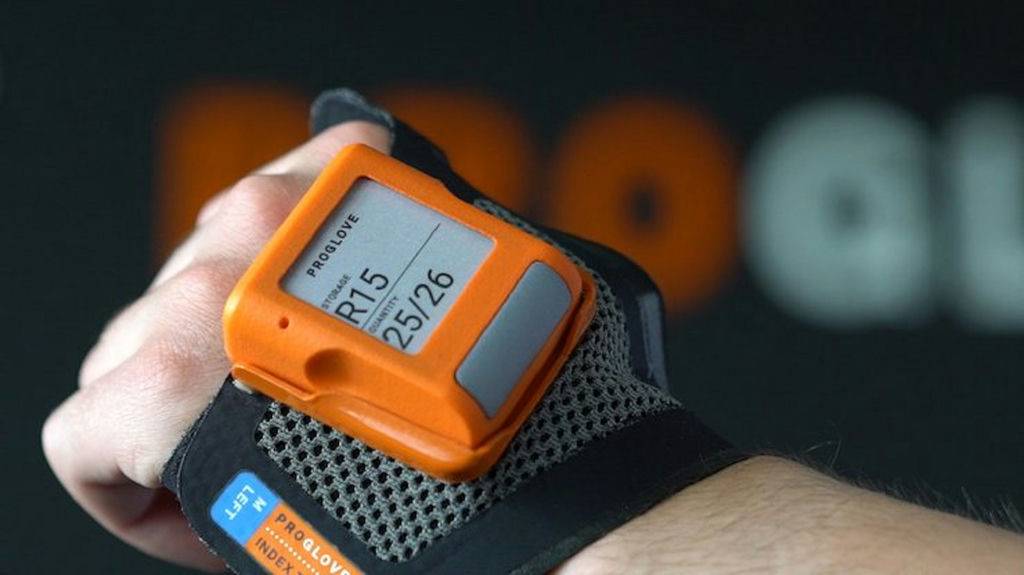
Barcode scanner manufacturer ProGlove has partnered with post-processing specialist DyeMansion to enter the series production of its latest wearable device.
Using DyeMansion’s POWERSHOT systems, the company has been able to create products with a more premium finish, including a fluorescent brand-matching color. The long-term partnership has also enabled ProGlove to ramp up the production of its new MARK Display scanner, and the firms are already working on its next product launch.
“In the beginning, the parts were spray-painted afterwards, but the color faded during use,” explained Konstantin Brunnbauer, VP of Production at ProGlove. “With PolyShot Surfacing we have superior surfaces. I think it’s perceived as a premium compared to some of the injection molded parts.”
“THE COLLABORATION HELPED US TO TRUST IN THIS TECHNOLOGY, AND TO FIND THE RIGHT WAY TO DESIGN IT IN A WAY THAT WE CAN USE IT.”
ProGlove’s industry 4.0 devices
Founded in 2014 and based in Munich, ProGlove manufactures its ‘MARK’ scanning devices and ‘Insight’ software range, which are designed to make smart wearables as user-friendly as possible. The firm’s products have often found automotive applications, and its previous clients include Audi, Volkswagen and Seat.
Initially, ProGlove used FDM 3D printing to create prototypes, but established that it wasn’t sufficient for producing functional devices. Switching to SLS, meanwhile, provided the firm with greater design freedom and the ability to print complex parts, but they still couldn’t match the quality provided by injection molding.
In particular, ProGlove was concerned about only being able to 3D print the devices in a white color and spray-paint them into different shades. After persistent use, the company noticed that its prototypes began to become discolored, and it sought a production solution that would allow it to consistently create high-quality products.
3D printing high-quality scanners
To overcome these teething issues, ProGlove outsourced the printing process to service provider FORMRISE, which proved capable of repeatably producing the devices. The firm then partnered with DyeMansion to help finish its products, and found that clients preferred the Polyshot-treated parts over injection molded ones.
As a result, ProGlove revised its post-processing setup, switching to the POWERSHOT machines for cleaning and surfacing, before using a DM60 system to apply coloring. Utilizing the ‘Print-to-Product’ process, the firm is now able to make its latest scanners with its customary orange motif, a vital part of its brand identity.
“When it comes to color, the white parts would have been a no-go. We wanted to have this orange lighting signal,” explained Brunnbauer. “When we first started dyeing with the DyeMansion DM60 it was the standard orange. DyeMansion has undertaken some color development, and now it is our ‘ProGlove Orange.’”
As a relatively new company, ProGlove intends to release fresh product iterations on a yearly basis, and using 3D printing, it’s been able to shorten its innovation cycle. Consequently, although the firm is currently scaling the launch of its new Display scanner, it’s already working with DyeMansion on new additions to its portfolio.
Here’s a very interesting case study by Dyemansion & ProGlove on the same.
Bengaluru, India – January 19, 2026 – Lodestar3D, a premier provider of advanced manufacturing solutions…
Lodestar3D, a prominent distributor of industrial 3D printing solutions in India, has announced the successful…
The International Advanced Research Centre for Powder Metallurgy and New Materials (ARCI) has signed a…
Since his postdoctoral days at MIT, Hang Yu, associate professor of materials science and engineering,…
Amritsar-based Amandeep Hospitals, in collaboration with Ujala Cygnus, has inaugurated North India’s first hospital-based 3D Printing and Virtual…
Engineers at The University of Texas at Austin are leading an academic and industry all-star…
This website uses cookies.